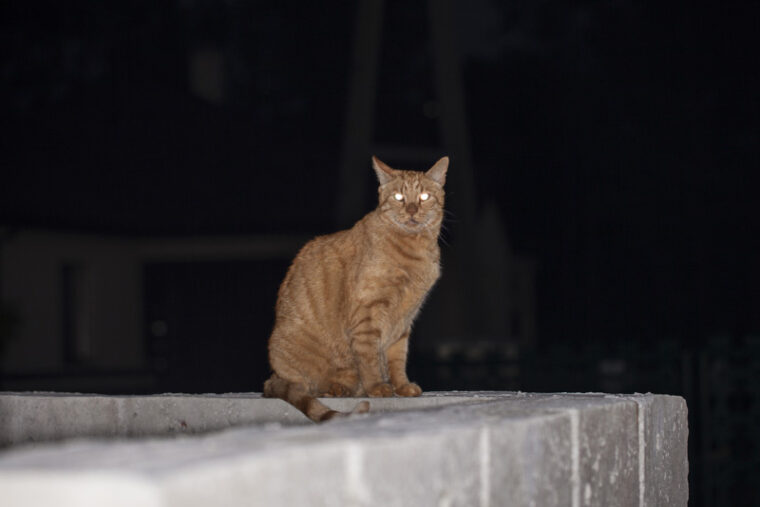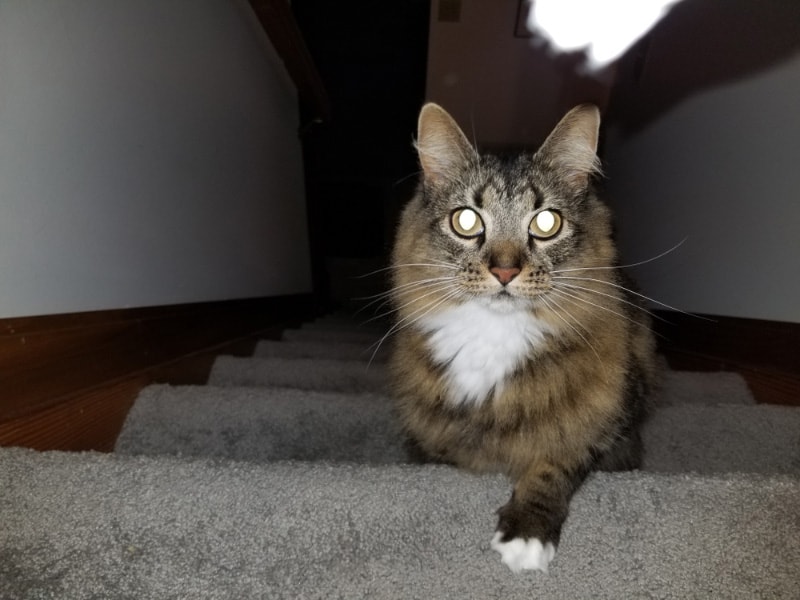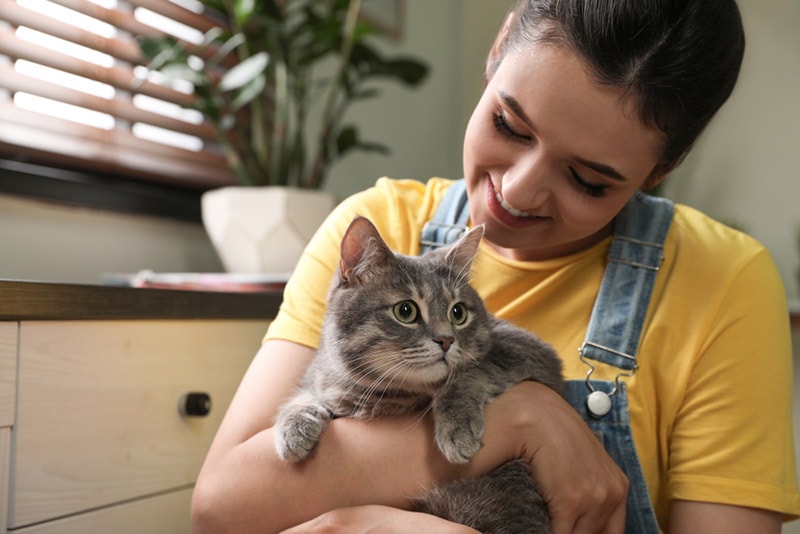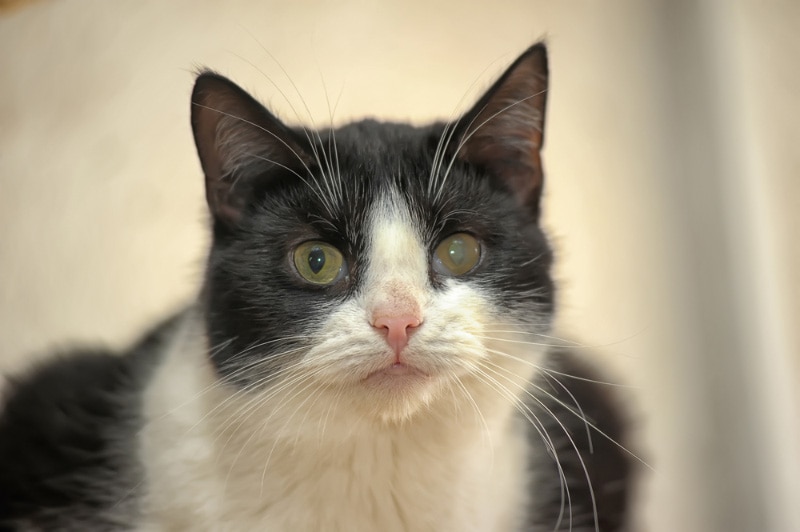
We’ve all seen a pair of glowing eyes shimmering in the darkness. If you come downstairs for a glass of water at night, you might have seen ones staring back at you in your very own home. Have you ever wondered what exactly makes a cat’s eyes glow, along with a wide selection of other animals?
The glowing can be attributed to a component called the tapetum. This interesting phenomenon not only has a neat explanation, but it also serves a valuable purpose. In this article, we will explore what causes eye glowing in cats and how it affects their overall vision.
What Causes Cat Eyes to Glow in the Dark?
It is a common misconception that cats are nocturnal. Contrary to popular belief, cats are actually not nocturnal but rather crepuscular. Crepuscular animals are designed to see very well in low light conditions—and anyone who has owned a cat can contest the fact that they are much more active in dawn and dusk hours.
However, crepuscular animals share some characteristics with nocturnal animals, including glowing eyes. So what exactly creates this glowing effect? It is a component called the tapetum lucidum. This term translates to “shining layer.”

Purpose of the Tapetum Lucidum
The tapetum lucidum is an incredible part of anatomy that helps enhance vision during low light hours. According to the National Institutes of Health,1 it acts as a biologic reflector system providing light-sensitive retinal cells a second opportunity for photon photoreceptor stimulation.
When light shines into the eye, it hits the photoreceptors (light receptors) at the back of the eye (the retina), which send information to the brain via nerves. Any light passing through the retina will reach the tapetum lucidum which then reflects the light back to the retina, like a little mirror. This gives it a chance to pick up more light signals. However, not all of this light is picked up by the retina and this light shows as a green glow, or eye shine as it bounces off the iridescent tapetum.
Cats are around 44% better at seeing in low light levels than humans.
Why Don’t Humans Have the Tapetum Lucidum?
There’s a pretty simple explanation for why humans don’t have the tapetum lucidum feature in their eyes. As you know, we aren’t crepuscular or nocturnal, but rather diurnal—meaning we see best in daylight hours.
Evolutionary-wise, we simply didn’t prioritize the power of seeing in low light to survive. Cats, along with many other animals, require this trait to both hunt and keep themselves safe from other predators.

Do Cats See Better than Humans?
Deciding who can see better between cats and humans is difficult. After all, they are equipped with a different set of features that help them see best for their species. For example, humans see a broad spectrum of colors that many animals cannot. Since we can see in broad daylight best, this vision feature comes in handy.
When it comes to the color spectrum, your cat sees in a much similar fashion to a human being who is colorblind. They see the world in various shades of gray and are pretty good at picking up on blues and yellows. However, cats can have quite a hard time distinguishing other colors, mainly red and green.
However, they make up for what they lack in color detection with their field of vision. Cats have a much wider vision field than we do, which is incredibly useful in spotting threats approaching them from either side.
Cats can see 200 degrees on either side, while humans can only see 180 degrees. So even though we see very differently, each of us has key parts that make our own set of visions advantageous.
Why Do Cat’s Eyes Glow Differently?
Most of the time, your cat’s eyes should glow yellow to green. Yellow-orange combinations are also often seen. The color does vary based on their irises, however. For example, if your cat has blue eyes, they might reflect different colors than a cat with golden eyes.
If your cat’s eyes glow two different colors, it might actually signal a problem with the eyes. It’s best to have them examined by your vet to ensure there is no underlying problem causing the eyes to reflect two distinct colors from each other.

Do All Cat’s Eyes Glow in the Dark?
All normal, healthy cats should have glowing eyes at night. It is a trait of many different animals to see in low-light settings. However, if you notice that your cat’s eyes do not glow at night, it could signal an underlying health condition.
Health Conditions that Prevent Glowing
Here are a few conditions that might make your cat’s eyes stop glowing:
Glaucoma
Felines can get glaucoma just like humans. With this condition, there is a watery fluid called aqueous humor in the front part of the eye that is unable to drain properly. This fluid accumulation results in increased pressure in the eye.
Left untreated, glaucoma could lead to partial or total blindness and is very painful. Certain breeds, like the Burmese or Siamese cat, are predisposed to this condition.
Cataracts
Cataracts are an increase in opacity of the lens of the eye. Because they develop a cloudy look and are more dense, it can cause the tapetum lucidum not to reflect appropriately. Cataracts can be treated by means of specialist surgery.

Conjunctivitis
Conjunctivitis is a prevalent feline eye disorder. An inflammation of the thin mucous membranes on the inner surface of the eyelids causes it. You might notice a crusty or runny discharge from the eye, which can in mild cases resolve independently.
However, if it doesn’t resolve on its own, or is not mild, you should seek veterinary help.
When to See Your Vet
If you suspect your cat has a problem with their vision, it’s best to make an appointment when you first notice signs. Take note of anything that might be contributing to the issue and explain what you’re concerned about.
Your vet can provide a physical exam to see if there is an underlying health condition causing the tapetum lucidum to not reflect as usual. Depending on the issue, your vet might prescribe certain medications or other treatments.

Do Cat’s Eyes Glow in the Day?
A cat’s eye should never glow in daylight hours. There is no real need for this to happen. If you are snapping a photo of them, you might notice that the image in the photo reflects the light. That is perfectly normal. However, if you see a cat’s eyes reflecting in the daytime, this is not a normal occurrence.
Conclusion
Now you can tell your friends that the reason why a cat’s eyes glow is due to the tapetum lucidum. This feature is not obvious during daylight hours but might be seen in a camera flash. This feature helps your crepuscular kitty see better in dawn and dusk hours, designed for survival and skill.
This trait has helped cats, raccoons, possums, and other crepuscular or nocturnal animals navigate in low-light settings.
Featured Image Credit: Maslowski Marcin, Shutterstock







